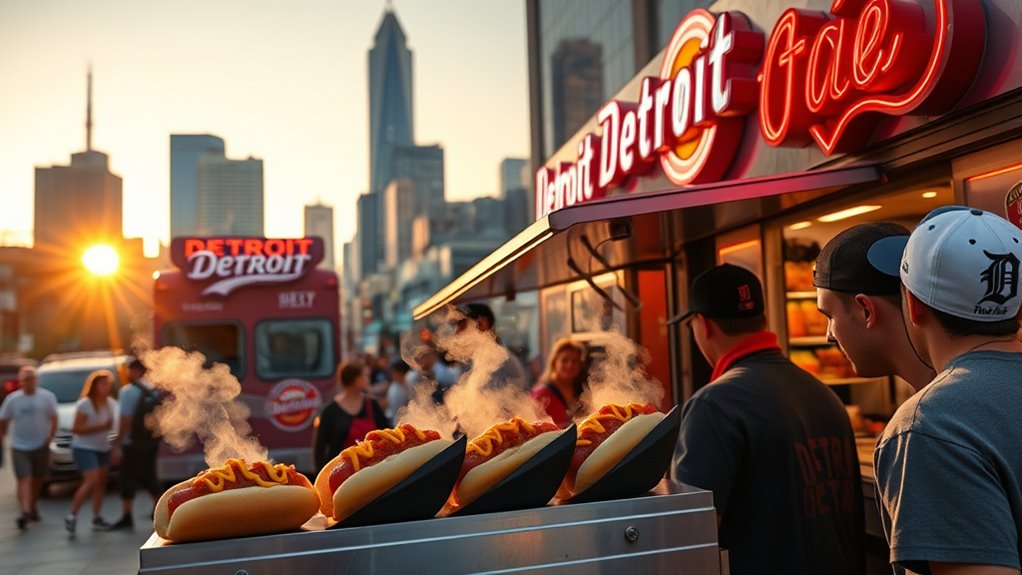Exploring Great Lakes and Coney Dogs in Detroit’s food trucks, you’ll discover a rich blend of regional history, immigrant influences, and culinary innovation. Food trucks showcase iconic Detroit-style Coney dogs with unique regional twists, vibrant flavors, and nostalgic charm. They not only serve delicious food but also foster community spirit and preserve local traditions. Curiosity about Detroit’s food scene will grow as you uncover the stories behind these beloved dishes and vibrant vendors.
Key Takeaways
- Detroit’s food trucks serve iconic Coney dogs, showcasing regional variations and historical influences from Greek and Macedonian immigrants.
- Many trucks focus on local ingredients and traditional recipes, preserving Michigan’s diverse culinary heritage.
- Food trucks act as mobile community hubs, promoting cultural pride and connecting neighborhoods through shared food experiences.
- Innovative trucks experiment with new flavors, dietary options, and presentation styles, blending tradition with modern culinary trends.
- Exploring Detroit’s food trucks offers a unique taste of Great Lakes region’s vibrant food scene and rich culinary history.
The Origins and Evolution of Detroit’s Coney Dogs

The origins of Detroit’s Coney dogs trace back to the late 1800s when hot dogs became a popular fast food at Coney Island in New York. Charles Feltman sold hot dogs in milk rolls as early as 1867, helping popularize the dish. Immigrants from Greece and Macedonia, fleeing economic hardship between 1900-1919, arrived in the U.S. near Coney Island and adopted the name for their hot dog stands. The term “Coney” comes from Coney Island, originally Dutch for “Rabbit Island,” and became linked to this style of hot dog. Nathan Handwerker, a Polish Jewish immigrant, helped spread the hot dog’s popularity, influencing its evolution across cities like Detroit, where Greek immigrants later introduced their own savory meat sauces, shaping the local Coney dog tradition. Additionally, the distinct regional toppings and preparation styles have contributed to the unique identity of Detroit’s Coney dogs.
Regional Variations and Culinary Diversity in Michigan

Michigan’s culinary scene reflects its regional diversity, from Detroit’s unique food truck styles to Flint’s distinct chili recipes. You’ll notice differences in how local communities prepare and flavor their favorites, showcasing cultural pride. Exploring these variations reveals how regional influences shape Michigan’s vibrant food landscape. Michigan’s agricultural diversity also means that fresh, locally-sourced ingredients are a staple across the state, further enriching its culinary traditions. Additionally, regional culinary techniques contribute to the unique character of each local specialty, highlighting Michigan’s rich food heritage.
Detroit vs. Flint Styles
Regional pride fuels the rivalry between Detroit and Flint coney styles, each showcasing distinct culinary identities rooted in local history and immigrant influences. You can taste the difference in sauce texture, meat choices, and presentation. Hydrocolloid material plays a crucial role in many acne patches, helping to draw out impurities and promote healing. 1. Flint’s drier, thicker sauce uses finely ground beef heart and spices like cumin and cayenne, offering a rich, firm bite. The use of beef heart gives Flint coneys a unique savory flavor that sets them apart. 2. Detroit’s wetter, tomato-based chili combines ground pork and beef, often including hot dogs, with garlic and mustard for a tangy kick. 3. Both styles top their hot dogs with mustard and onions, but Flint’s sauce emphasizes spice and texture, while Detroit’s leans toward sauciness and bold flavors. These regional variations reflect Michigan’s immigrant roots and working-class history, fueling local pride and culinary rivalry.
Regional Chili Variations
Across Michigan, chili variations reflect a rich tapestry of immigrant influences and local tastes, resulting in diverse styles that go beyond Detroit and Flint. Many regional chilis emphasize ground beef paired with tangy, mildly spiced sauces unique to each area. Toppings like diced onions, yellow mustard, and shredded cheddar are common, showing regional preferences. Some areas serve chili over spaghetti or hot dogs, blending comfort foods with local flavor. The iconic Michigan Coney Island chili stands out with its meat-forward, subtly spiced sauce, traditionally served on hot dogs topped with mustard and onions. Influences from Greek immigrants helped shape these recipes, adding a distinctive flair to Michigan’s chili culture. Michigan’s chili culture is also influenced by other regional culinary traditions, making it a diverse and evolving food scene. Additionally, the regional variations often incorporate unique cooking techniques that reflect local tastes and heritage. Overall, Michigan’s chili showcases versatility, hearty ingredients, and regional pride that define the local food scene.
Cultural Influences & Pride
Detroit’s culinary scene is a vibrant reflection of its diverse immigrant communities and local pride. You’ll find over 50 global cuisines among more than 1,000 restaurants, showcasing Michigan’s rich cultural influences. Dearborn’s Middle Eastern dishes highlight the community’s nearly half population of Middle Eastern descent. Greek immigrants shaped Detroit’s iconic Coney dogs, a tradition dating back to the early 20th century. In Mexicantown, Mexican and Tex-Mex flavors mirror migration from Jalisco and Oaxaca, while Finnish heritage influences local specialties like hand pies. Over 10 James Beard Award nominees in recent years further affirm Detroit’s culinary strength and recognition on the national stage. 1. Detroit-style square pizza and Coney dogs are local icons fiercely defended by residents. 2. Soul food, rooted in African American traditions, thrives in historic neighborhoods. 3. Food trucks bring multicultural, fusion cuisines directly to neighborhoods, celebrating diversity.
The Role of Food Trucks in Promoting Coney Dog Culture

Food trucks play a key role in keeping Detroit’s Coney Dog culture alive by sharing authentic recipes and regional ingredients. They reach new audiences at festivals and events, making the tradition more accessible and engaging. Plus, they innovate with modern twists while respecting the classic flavors that define Detroit’s culinary identity. By coordinating with reputable vendors, food trucks ensure the consistent quality and authenticity of Coney Dogs, helping to preserve this regional specialty. Additionally, leveraging predictive analytics for small business can help vendors optimize their inventory and marketing efforts, ensuring they meet customer demand effectively.
Authenticity Preservation
Food trucks play a vital role in preserving Coney Dog culture by faithfully reproducing the traditional recipes and cooking methods that define this Detroit specialty. You’ll find that they maintain key ingredients like natural casing hot dogs, white onions, yellow mustard, and beanless chili coney sauce, staying true to the original flavors. These trucks replicate the classic Detroit Coney Island experience by offering menus inspired by historic diner recipes, including Greek-American sides and sauces. They also adhere to traditional preparation methods, ensuring authentic taste despite being mobile. Additionally, they source ingredients locally to match historic flavor profiles. They follow strict cooking protocols to maintain the signature texture and taste. They serve as modern extensions of Detroit’s diner heritage, keeping tradition alive.
Cultural Engagement
Cultural engagement is at the heart of how food trucks promote Detroit’s iconic Coney dog heritage. They act as mobile ambassadors, bringing this beloved dish to diverse neighborhoods and events, helping to preserve Detroit’s immigrant roots from Greek and Macedonian entrepreneurs. By making Coney dogs accessible beyond traditional restaurants, food trucks foster local pride and strengthen a shared culinary identity among Detroiters. They serve as community gathering points, especially in underserved areas, and participate in festivals, sports games, and street fairs, embedding Coney dog culture into daily life. Collaborations with local vendors and artists also enhance cultural vibrancy. Through storytelling and social media, food trucks educate customers about the dish’s history, ensuring Detroit’s Coney dog tradition remains alive and celebrated across generations. The first coney dog was believed to be created in 1917 by Gust Keros at American Coney Island, further emphasizing the deep-rooted history that these food trucks help to keep alive. Additionally, their role in cultural preservation highlights how they serve as modern-day custodians of Detroit’s culinary heritage.
Culinary Innovation
Culinary innovation is central to how food trucks keep Detroit’s Coney dog culture fresh and appealing. These mobile eateries experiment with new flavors, presentation styles, and dietary options to attract diverse customers. For example, you might see:
- Variations like vegan hot dogs, loaded Coneys, and fusion dishes such as Coney mac and cheese, catering to evolving tastes.
- Creative combos like “Build Your Own Dog” and regional twists like “Vehicle City Coney,” blending tradition with innovation. Incorporating food trends helps these trucks stay relevant and appeal to a wider audience.
- Seasonal specials and new recipes tested quickly, allowing chefs to stay ahead of trends while honoring Detroit’s classic flavors.
- The incorporation of technology in ordering and marketing helps these trucks connect with a broader audience and adapt to modern consumer preferences.
This constant evolution guarantees the Coney Dog remains relevant, exciting, and accessible across different communities, keeping Detroit’s culinary heritage vibrant and forward-thinking.
Iconic Establishments Shaping Detroit’s Coney Legacy

Detroit’s iconic Coney establishments have shaped the city’s food scene through fierce rivalries and rich immigrant histories. Established in 1917, American Coney Island in Downtown Detroit symbolizes the city’s culinary heritage and is considered the birthplace of Detroit-style Coney dogs. Greek immigrants, especially Gust Keros, played a central role, founding American Coney and helping others establish their own shops like Lafayette, Kerby’s, Leo’s, and National Coney Island. These families brought Greek culinary influences, like Greek-style chili, into the menus. The rivalry between American and Lafayette Coney Island, originally owned by neighboring brothers, adds a unique cultural layer. These establishments, with their signature beanless chili and classic toppings, have become integral to Detroit’s identity, drawing locals and visitors alike. The Archives provide detailed historical insights into the development of these legendary eateries and their cultural significance over the years.
The Impact of Coney Dogs on the Local Economy and Community

The iconic Coney dogs are more than just a tasty treat—they’re a driving force behind Detroit’s local economy and community life. They support about 59,000 jobs across the food sector, including small vendors, food trucks, and supply chains. Here’s how they impact the city: 1. They generate $125 million annually in city and state taxes, fueling public services. 2. Coney dog vendors create entry-level jobs and entrepreneurial opportunities, fostering local small businesses. 3. Food trucks and stands serve as community hubs, promoting social bonds and inclusive participation across neighborhoods. Despite rising prices, these businesses continue to thrive, ensuring that the cultural significance of the Coney dog remains a vital part of Detroit’s identity. Additionally, the economic impact of these food vendors highlights their role in community development and local resilience.
How Food Trucks Celebrate and Preserve Detroit’s Food Heritage

Food trucks play a vital role in showcasing and preserving Detroit’s food heritage by bringing iconic local dishes directly to neighborhoods and events. They highlight regional ingredients and recipes passed down through generations, keeping Detroit’s culinary traditions alive. These trucks often feature signature items like Coney dogs, Detroit-style pizza, and paczkis as marketing tools to attract both locals and tourists. Additionally, they serve as dynamic communication exercises that strengthen community bonds and celebrate local culture.
Frequently Asked Questions
How Do Food Trucks Adapt Traditional Coney Dog Recipes for Street Service?
You adapt traditional coney dog recipes for street service by prepping ingredients ahead, like cooking meat and onions in advance. You use quick-cooking chili without beans, portion toppings ahead, and choose buns that resist sogginess. You streamline assembly with minimal toppings, standardize hot dog sizes, and employ portable warming equipment. Local brands and shelf-stable condiments guarantee authenticity and consistency, helping you serve hot, flavorful coney dogs efficiently in busy street environments.
What Are the Key Differences Between Detroit and Flint-Style Coney Dogs?
You’ll notice Detroit and Flint-style coney dogs differ mainly in sauce and meat. Detroit’s features a wet, chili-like, saucy meat that fully covers the hot dog, often made with a blend of beef and pork. In contrast, Flint’s style uses a drier, crumbly seasoned ground beef topping that’s less moist and scattered over the hot dog. The buns in Detroit absorb some sauce, adding moisture, while Flint’s bun stays drier.
How Do Coney Dog Festivals Impact Local Community Engagement?
Imagine you’re back in the 1950s, gathered at a Coney dog festival—today, these events still boost community engagement. You’ll find families, friends, and local groups connecting over shared traditions. Participating in contests, enjoying live music, or volunteering helps residents feel pride and ownership. These festivals strengthen bonds, celebrate Detroit’s culinary roots, and invite everyone to take part in preserving the city’s vibrant, diverse culture.
Are There Vegetarian or Vegan Coney Dog Options Available in Detroit?
You’ll find that Detroit offers several vegetarian and vegan coney dog options. Places like Chili Mustard Onions serve all-vegan versions with plant-based hot dogs and chili, topped with classic onions and mustard. Food trucks and some restaurants have adopted these options, making them accessible across the city. While traditional chains stick to meat, the vegan scene is growing, giving you tasty, guilt-free alternatives that blend Detroit’s classic comfort food with plant-based innovation.
How Do Historic Rivalry Stories Influence Modern Coney Dog Branding?
Imagine a rivalry so fierce it defines a city’s culinary soul. That’s exactly what shapes modern Coney dog branding in Detroit. You see, stories of family feud and tradition aren’t just history—they’re the secret sauce that adds authenticity and excitement. Each establishment leverages this legacy to stand out, creating a compelling narrative that draws you in, making every bite a taste of Detroit’s rich heritage and enduring pride.
Conclusion
Don’t let skepticism hold you back—exploring Detroit’s food trucks and savoring a Coney Dog is a delicious journey you won’t regret. These vibrant trucks celebrate the city’s rich culinary history, blending tradition with innovation. Even if you’re new to the scene, give it a try; you might discover a new favorite. Embrace the flavors, support local vendors, and experience Detroit’s unique food culture firsthand. It’s a taste you’ll want to revisit.









